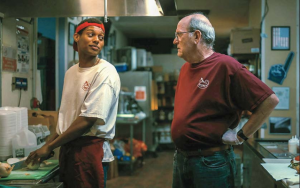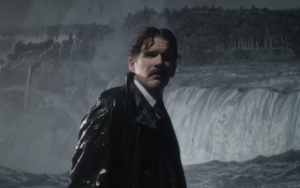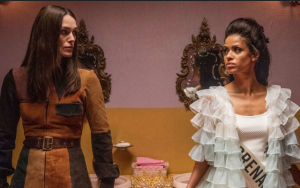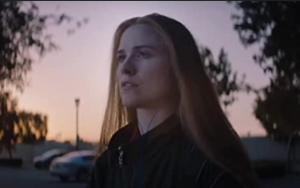eTalk: Richard on judging the #InspiredbyTenet video contest!
 Richard and “eTalk” host Tyrone Edwards talk about the Christopher Nolan movie “Tenet” and the prize winning #InspiredbyTenet short film “Seeds.”
Richard and “eTalk” host Tyrone Edwards talk about the Christopher Nolan movie “Tenet” and the prize winning #InspiredbyTenet short film “Seeds.”
Watch the whole thing HERE!
 Richard and “eTalk” host Tyrone Edwards talk about the Christopher Nolan movie “Tenet” and the prize winning #InspiredbyTenet short film “Seeds.”
Richard and “eTalk” host Tyrone Edwards talk about the Christopher Nolan movie “Tenet” and the prize winning #InspiredbyTenet short film “Seeds.”
Watch the whole thing HERE!
 Stanley (Richard Jenkins) has worked the graveyard shift at Oscar’s Chicken and Fish in Albion, Michigan for thirty-eight years. In 1971 he made $3.10 an hour. Now, almost four decades later, after never missing a day, he’s making a whopping $13.50. “This wasn’t my dream job when I started,” he says, “but it turned out pretty well for me.”
Stanley (Richard Jenkins) has worked the graveyard shift at Oscar’s Chicken and Fish in Albion, Michigan for thirty-eight years. In 1971 he made $3.10 an hour. Now, almost four decades later, after never missing a day, he’s making a whopping $13.50. “This wasn’t my dream job when I started,” he says, “but it turned out pretty well for me.”
His time at Oscar’s is coming to a close. He’s given notice at the flophouse where he lives, quit the job and has plans to move to Florida to look after his ailing mother.
Before he hits the road he has to train his replacement, a Jevon (Shane Paul McGhie), a bright young man on parole after being arrested for defacing a monument.
The two spend a few nights together, with Jevon learning the ropes from Stanley.
“There’s an art to the third shift,” says Stanley. “Once I had to make my own pickles. Once we had a birthday party and we ran out of ketchup. It wasn’t pretty but I did what I had to do.”
The two have little in common, except that they both need this job. For Stanley it has been his whole life. His greatest achievement the creation of “The Stanwich” and he takes pride in the work. Jevon doesn’t care about the rules and regulations but will be sent back to County Jail if he doesn’t keep the job.
“The Last Shift” is a low-key drama that that threatens to break out into a feel-good movie where Stanley and Jevon learn from one another, each propping the other up. It is to director Andrew Cohn’s credit that the saccharine stuff is kept in Oscar’s condiment section and never allowed to bleed into the story.
Jenkins is the embodiment of a man whose life has passed him by. He believed that hard work was enough to build a good life. Trouble is, he’s been exploited by an owner who pays him less than he could make if he quit and went to work at any other fast food chain and now, thirty-eight years later, he has nothing to show for all those nights of working midnight to six. He is stuck in his ways, and his knees and back ache as much as his spirit.
Jevon, who used to write about politics for his school newspaper before being arrested on trumped up charges, is realistic about the situation he and Stanley find themselves in. His awareness irks Stanley, forcing him to confront the failure that has characterized his life.
“The Last Shift” is a wonderfully performed, if somewhat downbeat, portrait of the underbelly of the American Dream. It examines issues of white privilege—“That’s just baloney!” Stanley bellows. “No one ever gave me nothing.”—racial bias and how, despite the best of intentions, sometimes things just don’t work out. A timely treatise on the lives of overlooked people, “The Last Shift” is a tragedy with equal parts soul and heartbreak.
 Serbian-American inventor Nikola Tesla (Ethan Hawke) was a man with an eye to the future. He’s best known for best known for his innovations in the transmission and application of electric power but his restless mind was always engaged, burning hot with new ideas.
Serbian-American inventor Nikola Tesla (Ethan Hawke) was a man with an eye to the future. He’s best known for best known for his innovations in the transmission and application of electric power but his restless mind was always engaged, burning hot with new ideas.
If we are to believe “Tesla,” a fanciful postmodern biopic starring Ethan Hawke, now on VOD, he had the ability to project himself into the future, predicting what was to come, including x-rays and even the Tears for Fears hit “Everybody Wants to Rule the World.”
A knowing mix of fact and fiction, “Tesla” is narrated by Anne Morgan (Eve Hewson), daughter of financier and banker J.P. Morgan, who says after one flight of fancy, while scrolling through her MacBook Pro, “This is pretty surely not how it happened.” It’s a self-aware story, filled with authenticity but also anachronisms to paint a portrait of a man out of time.
Detailing the period in Tesla’s life from his early work with Thomas Edison (Kyle MacLachlan) at the Edison Machine Works on New York’s Lower East Side through to his encounters with the leading lights of the era, J.P. Morgan (Donnie Keshawarz), renowned French actress Sarah Bernhardt (Rebecca Dayan) and entrepreneur George Westinghouse (Jim Gaffigan). It’s a heady time that sees Tesla dream big and fail bigger, ultimately reduced to begging Morgan for money before dying penniless and alone at the age of 86 in Room 3327 of the Hotel New Yorker.
“Tesla” is not a tale for history buffs. Edison is seen with an iPhone and a gaggle of heiresses listen to electro-pop but these anachronisms aren’t for effect, like spotting the wristwatch on Matthew Broderick’s arm in the 1800s set “Glory” or the iPod Touch in “The Hurt Locker,” three years before the mobile devices were in stores, they’re meant to add to the poetry of the telling, as metaphors for the forward-thinking inventor. “Maybe the world is a dream,” says Anne Morgan, “that Tesla dreamed first.”
Tesla, the man, aimed high, hoping his inventions would set people free to enjoy pursuits of the mind. “That motor will do the work of the world,” he says in the film. “It will set men free.” Similarly, the movie aims high, and while it takes chances—see the above mentioned “Everybody Wants to Rule the World” scene—it is as idiosyncratic as the man it portrays.
 Fifty years after the 1970 Miss World pageant erupted into chaos a new film documents the events that sent host Bob Hope scurrying from the stage, bombarded by flour bombs and heckles. “Misbehaviour,” a new British film starring Keira Knightley and Gugu Mbatha-Raw, and now on VOD, sees members of the nascent British women’s liberation movement rebel against the show’s objectification of its contestants and Hope’s terrible jokes. “I consider the feelings of women,” he says, “I consider feeling women all the time.”
Fifty years after the 1970 Miss World pageant erupted into chaos a new film documents the events that sent host Bob Hope scurrying from the stage, bombarded by flour bombs and heckles. “Misbehaviour,” a new British film starring Keira Knightley and Gugu Mbatha-Raw, and now on VOD, sees members of the nascent British women’s liberation movement rebel against the show’s objectification of its contestants and Hope’s terrible jokes. “I consider the feelings of women,” he says, “I consider feeling women all the time.”
Knightley is Sally Alexander, a single mother and academic who believes the women’s liberation movement must address systemic sexism if there is to be meaningful change. Jo Robinson (Jessie Buckley) takes a more hands-on approach, defacing statues and sexist billboards. Despite differing approaches, they focus their efforts on the Miss World pageant, an annual event with a world-wide television audience of over 100 million people.
In a parallel story Gugu Mbatha-Raw is Jennifer Hosten, Grenada’s first competitor in Miss World. Intelligent, elegant and composed, she’s willing to endure the contest’s objectification for the chance to make history as the first woman of colour to win the pageant crown. “You are a very lucky person if you think this is being treated badly,” she tells Miss Sweden, Maj Johansson (Clara Rosager).
“Misbehaviour” is an ambitious movie disguised as a feel good Britcom. Issues are raised and the era is vividly portrayed trough fashion and the attitude of the pageant’s organizers, but the story’s main point, that feminism comes in many styles and can mean different things to different people, is broached in a superficially earnest way, but never explored. Alexander and Robinson see the absurdity of the beauty contest is liken to a “cattle market.” The farcicality of it all, the bathing suit competition, the numbers on the wrists, is not lost on Hosten but for her it is an opportunity to make a statement to other woman and girls who look like her that this, and anything else in life, is possible. That doors can be opened.
Knightley and Buckley are reliably good but it is Mbatha-Raw who brings the heart and soul to “Misbehaviour.” More than just a retelling of the flour-bombing of Bob Hope or a history lesson on the roots of the women’s liberation movement (at the end we actually meet the real-life counterparts of the film’s characters), it’s character study of Hosten. She may not be the focus of the story, that’s Alexander and Robinson, but Mbatha-Raw’s warmth tempered by inner unease makes her the movie’s most layered and interesting character.
 “Kajillionaire,” a poignant comedy from director Miranda July and now playing in theatres, is an absurdist tale of survival and control.
“Kajillionaire,” a poignant comedy from director Miranda July and now playing in theatres, is an absurdist tale of survival and control.
The Dynes, Robert (Richard Jenkins), Theresa (Debra Winger) and daughter Old Dolio (Evan Rachel Wood), are a crime family struggling to survive. They live in a low-rent abandoned office next to a bubble factory, where pink bubbles overflow through the vents into their space. Clip artists, they eke out a living by pulling low level scams that are often more work than they’re worth. Even their daughter’s name is part of a con job. They named her after a homeless man who won the lottery in the long shot hope that he would notice and write her into his will.
When Old Dolio wins a trip to New York they concoct a luggage and travel insurance swindle that could finally put them in the bigtime… or at least allow them to pay their back rent and avoid eviction.
Like all their stings, things don’t go as planned but they do meet Melanie (Gina Rodriguez), an outgoing young woman with the makings of a good grifter. Despite Old Dolio’s misgivings about bringing an outsider into their tightly knit group, the Dynes and Melanie set about to separate easy marks from their money.
What begins as an unconventional crime story soon turns into Old Dolio’s story of self-discovery as she comes to realize that her upbringing has left her unprepared for the world outside the petty criminality that has been her life.
Jenkins, Winger and Rodriguez bring something unique to each of their characters. Jenkins and Winger exude desperation as the rumpled, bumbling small timers, while Rodriguez is all charm and warmth as their protégée but it is Wood who steals the show.
Wood transforms completely to play Old Dolio. With waist-length straw hair obscuring her face she drops her voice an octave or two and adopts the physicality of someone who learned how to walk from reading books. It’s a wonderfully nuanced comedic character but there’s more to her than awkward behaviour and a silly name. Wood keeps Old Dolio’s emotions under wraps for much of the film, but there’s an apparent inner life that becomes more and more apparent as she begins to wake up and make a connection with someone whose last name isn’t Dyne for the first time in her life.
Intentionally stilted and oddball, Wood makes Old Dolio the beating heart of “Kajillionaire,” a story that derives its emotional stability from a character whose parents were never emotional or stable with her.
 “Queen of the Morning Calm,” a new family drama starring Tina Jung and now playing in theatres, is a story of redemption set against a backdrop of violence and sex work.
“Queen of the Morning Calm,” a new family drama starring Tina Jung and now playing in theatres, is a story of redemption set against a backdrop of violence and sex work.
Jung is Debra, a 29-year-old Korean woman who works as a dancer in a strip club to support her precocious daughter Mona (Eponine Lee), a ten-year-old student in private school. She’s taking steps toward a better life for her family but with each move forward comes a setback, usually in the form of Debra’s boyfriend Sarge (Jesse LaVercombe), an itinerant father who comes and goes, often disappearing with no explanation.
When he isn’t gambling away all their money, he’s making pie in the sky promises of money and being a better father to Mona. Convinced that Sarge is the true love a fortune teller once predicted Debra endures his nonsense.
When he takes off with all their money, Debra’s life spins out of control. A missing-in-action babysitter and a failed job interview put her in a desperate situation. Unable to pay her rent, she’s tossed out on the street.
Ian (Shaun Benson), a kindly neighbor who has always had a crush on Debra, comes to the rescue with a job and a sense of stability. When Sarge comes back into their lives like a whirlwind, Debra must decide what is best for her moving forward.
Debra’s path in life is not easy but director Gloria Kim never wallows in the misfortune of her story. The hurdles in Debra’s life are realistically portrayed, emotional and she is even sometimes the architect of her own misfortune, but there is an optimism to the story that no matter how bad things get, they can and will, get better. It is a journey of deliverance for both Debra and Mona, made more real by engaging performances from Jung and Lee.
“Queen of the Morning Calm” is a self-assured feature debut for Kim, who worked for a decade to bring this story to the screen. Her story of Debra’s empowerment, of self-discovery, is honest and heartbreaking, steely yet vulnerable and handled with great sensitivity.
 You know how “We Are Many,” a new documentary about the 2003 protests against the Iraq War, now playing in theatres, ends. The Stop the War movement, which began on a grassroots level but spread like wildfire to almost 800 cities worldwide, didn’t prevent the US/UK led shock and awe, but it did unite the world in a single cause.
You know how “We Are Many,” a new documentary about the 2003 protests against the Iraq War, now playing in theatres, ends. The Stop the War movement, which began on a grassroots level but spread like wildfire to almost 800 cities worldwide, didn’t prevent the US/UK led shock and awe, but it did unite the world in a single cause.
Director Amir Amirani pieces together a compelling portrait of the anti-war crusade using a combination of archival news and web footage, bulked up with new talking head style interviews from academics like Noam Chomsky, politicians Clare Short to David Blunkett and actor Mark Rylance who suggests former British Prime Minister Tony Blair should be tried for war crimes. Novelist John le Carré, who marched in the million strong London parade, doubles down, calling the Iraq War, “the crime of the century.”
It’s a vividly presented doc, nine years in the making, that rehashes much of what we already know—there were no weapons of mass destruction, for instance—with eye-opening new revelations. It’s claimed that billionaire Richard Branson tried to arrange a summit meeting between Nelson Mandela and UN Secretary-General Kofi Annan in Baghdad, to convince Saddam Hussein to go into hiding.
Amirani effectively displays the callous attitude of the warmongers in a montage that cuts between President George Bush joking about the lack of “weapons of mass destruction” to a guffawing audience and pictures of the effects of war. The powerful imagery leaves an indelible mark.
“We Are Many” takes us back to the days, post 9/11, when the likes of Blair and Bush dominated the news with hysterical claims of the world ending threats of WMDs, but ends on a more upbeat, we won’t get fooled again note.
 Richard joins “CP24 Breakfast” host George Lagogianes to run down the big winners at last night’s Pandemmy’s.
Richard joins “CP24 Breakfast” host George Lagogianes to run down the big winners at last night’s Pandemmy’s.
Watch the whole thing HERE!
 On the September 20, 2020 edition of the Richard Crouse Show we meet Gloria Kim, writer/director of a new family drama called “Queen of the Morning Calm.” In this interview we about the eleven years she spent working to get this story to the screen, How her background in journalism (former Maclean’s reporter) informed the writing of this story, how she guided her eleven year old co-star Eponine Lee through the film’s difficult material and much more.
On the September 20, 2020 edition of the Richard Crouse Show we meet Gloria Kim, writer/director of a new family drama called “Queen of the Morning Calm.” In this interview we about the eleven years she spent working to get this story to the screen, How her background in journalism (former Maclean’s reporter) informed the writing of this story, how she guided her eleven year old co-star Eponine Lee through the film’s difficult material and much more.
Then, former CTV Toronto crime reporter Tamara Cherry joins the show to talk about her new book, “All the Bumpy Pebbles,” a novel based on her reporting of human trafficking cases.
Finally, Kevan Staples, former keyboardist for Rough Trade and co-writer of the classic hit “High School Confidential,” stops by to talk about the history of the controversial tune.
Listen to the whole thing HERE!
Here’s some info on The Richard Crouse Show!:
Each week on the nationally syndicated Richard Crouse Show, Canada’s most recognized movie critic brings together some of the most interesting and opinionated people from the movies, television and music to put a fresh spin on news from the world of lifestyle and pop-culture. Tune into this show to hear in-depth interviews with actors and directors, to find out what’s going on behind the scenes of your favourite shows and movies and get a new take on current trends. Recent guests include Ethan Hawke, director Brad Bird, comedian Gilbert Gottfried, Eric Roberts, Brian Henson, Jonathan Goldsmith a.k.a. “The most interesting man in the world,” and best selling author Linwood Barclay.
Click HERE to catch up on shows you might have missed!